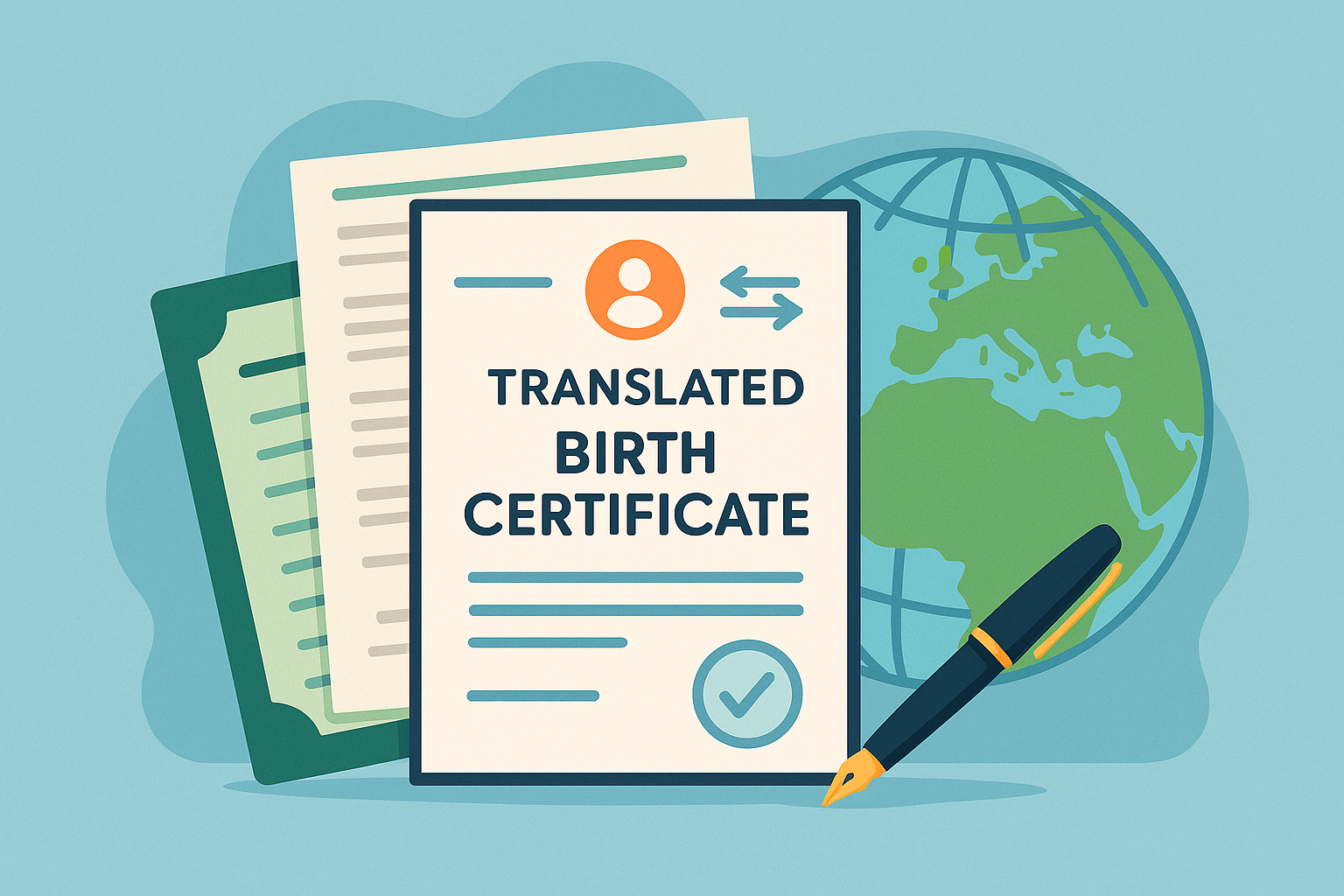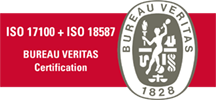Complete Guide to Birth Certificate Translation
Do you need to submit a birth certificate translation to study, work, or live abroad? This is one of the most frequently requested documents by embassies, universities, and courts — and it is only accepted when properly certified.

This guide explains, step by step, everything you need to know: legal requirements, types of translation, certification, notarization, common mistakes, costs, and how to choose the right provider. The goal is simple: to ensure that your translated birth certificate is accepted in Portugal, Spain, France, England, Germany, Brazil, and Angola — without delays or complications.
When a Birth Certificate Translation Is Required
Legal and Official Requirements
Immigration authorities, universities, courts, and public bodies often require a certified translation of birth certificates that are not in the official language of the country.
Common examples include:
- United States (USCIS): certified translation into English required for visas, citizenship, and residency processes (USCIS official guidance).
- United Kingdom (UKVI): only accepts certified translations with translator details (UK government guidance).
- Canada (IRCC): translation into English or French, in some cases with notarization (IRCC guidance).
- Portugal, Spain, France, Germany, and Angola: courts, universities, and registries require full certified translations.
- Brazil: public notaries and official bodies require translations done by sworn translators (tradutores juramentados).
For a detailed overview, see our article on what a certified translation is.
European Union vs. Outside the European Union
Within the European Union, birth certificates issued by a member state are generally recognized in other EU countries without translation if accompanied by the multilingual standard form (available from registries).
This means, for example, that a Portuguese birth certificate can be accepted in France or Spain without additional translation, when presented with this form.
You can consult the full legal framework in Regulation (EU) 2016/1191 on public documents.
Outside the EU, the situation is different:
- Countries such as the US, UK, Canada, Brazil, or Angola almost always require a certified translation.
- In many cases, an Apostille under the Hague Convention or consular legalization may also be necessary.
If your destination is outside the EU, always confirm with the receiving authority whether a certified translation is sufficient or if additional authentication is required.
Comparison: EU vs. Non-EU
| Destination | Is a birth certificate translation required? | Notes |
|---|---|---|
| European Union | No, if accompanied by the multilingual form | Regulation (EU) 2016/1191 ensures acceptance of public documents. |
| Outside the EU | Yes, almost always | Certified translation required; Apostille or consular legalization may also be needed. |
Most Common Situations
Birth certificate translation is required for:
- Immigration and visa applications;
- University enrollment abroad;
- Marriage and family registration;
- Court cases and international inheritance;
- Family reunification;
- Citizenship recognition.
Risks of an Inadequate Translation
An incomplete or uncertified translation can result in:
- Immediate rejection of your application;
- Delays and additional costs;
- Legal problems or missed deadlines.
See more in our frequently asked questions on translation.
What Is a Certified Birth Certificate Translation
Certified vs. Notarized Translation
- Certified: the translator provides a signed written statement declaring the translation to be complete and accurate.
- Notarized: the notary only verifies the identity of the translator, not the translation itself.
Most processes only require a certified translation, but in some cases (such as international procedures or obtaining apostilles) notarization may also be required.
For more details, see our guide to certified vs. notarized translation.
For official information on document authentication, consult the Hague Conference – Apostille Section.
Who Can Certify
Only professional translators or recognized agencies can provide certified translations. Translations done by family members or friends are not accepted.
At M21Global, we work exclusively with specialized translators, ensuring translations accepted worldwide. Learn more about our certified translation company.
Accepted Formats
Depending on the receiving authority:
- Secure PDF with digital signature and certification statement;
- Printed certified copy sent by mail.
In Portugal, Spain, France, England, Germany, Brazil, and Angola, both formats are commonly accepted depending on the process.
For reference, see European e-Justice Portal on public documents.
Step by Step: How to Translate Your Birth Certificate
- Obtain a legible copy of the original document.
- Check the authority’s requirements (language, certification, notarization).
- Choose a qualified provider (ISO 17100, native specialized translators).
- Submit the document securely for translation.
- Review the translation to confirm names, dates, and seals are correct.
- Receive the certification (and notarization, if required).
- Submit the translated document to the competent authority.
Common Mistakes to Avoid
- Omitting names, dates, or official seals.
- Using non-certified translators or automatic tools.
- Forgetting the signed certification statement.
- Submitting illegible copies of the original document.
Costs and Timeframes
- Translating a birth certificate is usually quick: 24 to 48 hours for simple documents.
- Costs vary depending on page count and language combination. At M21Global, we provide clear quotes with no hidden fees.
Why Choose M21Global
At M21Global we provide:
- Certified birth certificate translations accepted in Portugal, Spain, France, England, Germany, Brazil, and Angola;
- Compliance with ISO 17100 standards, ensuring quality and confidentiality;
- Fast turnaround (24–48h) with secure handling;
- A team specialized in legal and official translations.
See more reasons in why choose a professional translation company.
Get your free quote now: Certified Birth Certificate Translation.
Conclusion
A birth certificate translation is not just a formality — it is a crucial step to ensure your immigration, education, or legal processes move forward without issues.
By choosing professional certified translators, you avoid delays, rejections, and unnecessary stress.
If you need a translation accepted in Portugal, Spain, France, England, Germany, Brazil, or Angola, talk to us at M21Global. Our international expertise and certification are your guarantee of peace of mind.
Frequently Asked Questions on Birth Certificate Translation
When is a birth certificate translation required?
Whenever a birth certificate needs to be submitted in a country with a different official language. This is common for immigration, visas, marriages, universities, and courts.
Who can provide a certified birth certificate translation?
Only professional translators or recognized agencies such as M21Global. Translations done by family or friends are not accepted.
Is a birth certificate translation valid across the European Union?
Within the EU, birth certificates are accepted without translation if accompanied by the multilingual form under Regulation (EU) 2016/1191. Outside the EU, certified translation is almost always required.
How long does it take to translate a birth certificate?
Normally between 24 and 48 hours, depending on the number of pages and the language pair. In urgent cases, shorter deadlines can be requested.

